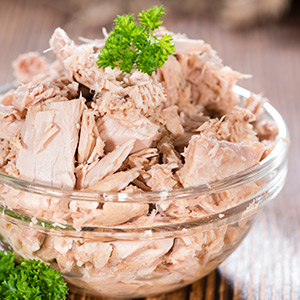Tuna
Fill up on omega-3!

Tuna is one of the most widely consumed fishes in the world. It’s no wonder — so meaty, easy to cook and can be prepared a variety of ways, this popular fish certainly goes the distance at mealtime.
Characteristics
There are many species of tuna, though yellowfin and albacore tuna are the most popular. They are fished worldwide in tropical and temperate waters.
Yellowfin tuna (thunnus albacores) varies from pink flesh in smaller fish to deeper red in larger fish. It is important not to confuse the yellowfin with the threatened bluefin tuna (thunnus thynus ) that also has red flesh.
Why does tuna have red flesh?
Tuna are incredibly fast, strong swimmers. Oxygen is needed in high quantities to keep the muscles going at such a fast pace. This large amount of oxygen creates that red-coloured flesh. While salmon has pink-coloured flesh, its hue results from the accumulation in muscle of pigment found in what they eat.

Culinary tips and advice
Tuna can be cooked, but it’s also delicious raw, in tuna tartar, or marinated. It is without a doubt the easiest fish to include in a menu. To preserve tuna's attractive interior hue and its moist and meaty quality when grilling, we recommend searing or cooking lightly on high heat (to rare or medium-rare).
Availability
Your Metro fishmonger carries tuna throughout the year, fresh or frozen, in fillets or in steaks. Metro adheres to a policy of sustainable fishing methods to ensure the preservation of our natural resources. As such, we only sell species that are scientifically proven to be present in sufficient quantities, and whose fishing rates are sustainable. For more information, see our sustainable fisheries policy and temporarily withdrawn species.
Nutritional value
Tuna is a fatty fish and an excellent source of vitamins A and B12. It also provides a generous amount of phosphorus, potassium and magnesium. For the weight-conscious, steaming, poaching or cooking in parchment would be the methods of choice.
Storage life
Fresh fish should be prepared as soon as possible following purchase.
| Refrigerator 4° C (40° F) | Freezer -18° C (-4° F) | |
| Fresh tuna | 2 to 3 days | 4 to 6 months |
| Cooked tuna | 1 to 2 days | ------ |
Try one of these delicious recipes












